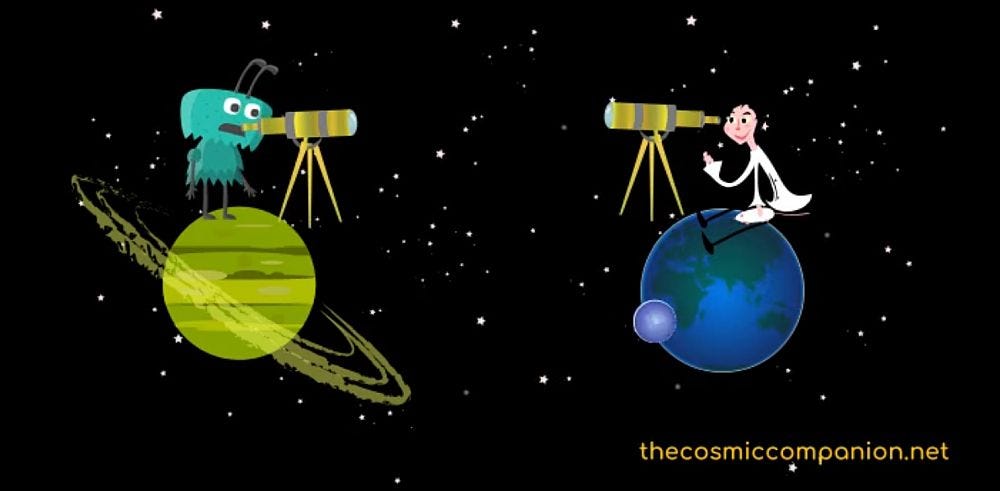Where Do Alien Astronomers Need to be to Find Life on Earth? - The Cosmic Companion June 25, 2021
One of the best ways astronomers (the human kind) have to study exoplanets is to see them pass in front of their star. So, where should an astronomer (the alien kind) be to find life on Earth?
Alien astronomers would have a better chance to discover life on Earth, if our worlds are lined up just right, a new study shows.
A new study examines where alien astronomers should be if they want to find signs of life on Earth in our atmosphere. Image credit: The Cosmic Companion
As astronomers search distant star systems looking for exoplanets, many hope to find the telltale signs of life on other worlds. A new study examines this search from the opposite point of view — identifying worlds where extraterrestrial astronomers may be able to discover life on Earth.
Astronomers (the human kind) have found 1,715 stars within 326 light years of Earth where astronomers (the alien kind) would have been able to detect life on Earth during the last 5,000 years.
“One might imagine that there are worlds beyond Earth that have already detected us and are wondering if they are alone in the Cosmos. This catalog is an intriguing thought experiment for which one of our neighbors might be able to find and study Earth,” Jackie Faherty, a senior scientist at the Department of Astrophysics at the American Museum of Natural History, describes.
Read more: https://thecosmiccompanion.net/where-do-alien-astronomers-need-to-be-to-find-life-on-earth
Upcoming guests on Astronomy News with The Cosmic Companion
This summer is BURNING HOT with amazing guests!
June 29 (s4/e26): Alyssa Mills, Graduate intern at JPL, talks about the largest moon in the Solar System, Ganymede.
PLUS - ~just announced~ Learning about the newly found mega-comet Bernardinelli-Bernstein with discoverer Dr. Pedro Bernardinelli!
July 6 (s5/e1): SEASON FIVE PREMERE! New York Times bestselling author Earl Swift, author of Across the Airless Wilds, the first major history of NASA’s lunar buggy.
July 13 (s5/e2): Dr. Stella Kafka, CEO of The American Association of Variable Star Observers, returns to the show, talking about Betelgeuse.
July 20 (s5/e3): Geoff Notkin, host of Meteorite Men on the Science Channel and president of the National Space Society, talks meteorites.
July 27 (s5/e4): ~just announced~ CHIME member Kaitlyn Shin, MIT grad student, explains fast radio bursts (FRBs)
August 3 (s5/e5): Teaching science to children with Dr. Stephanie Ryan, author of “Let’s Learn Chemistry.”
Remember - VIP members see every episode of this show a day early! Plans start at just $5 a month - subscribe today!
For more details on space and astronomy news, please visit: thecosmiccompanion.net or thecosmiccompanion.com.
Thanks for reading, donating, and sharing!
- James



